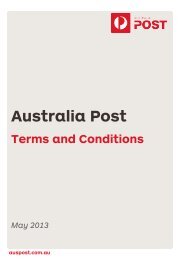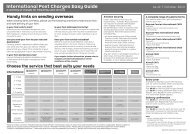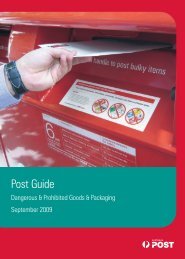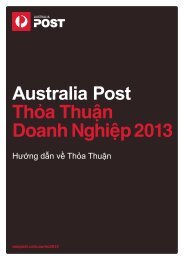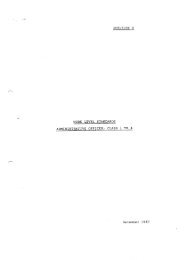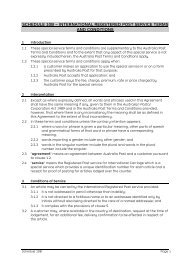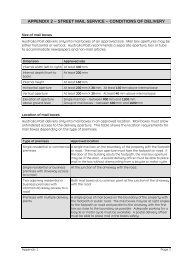2004-05 Annual Report - Australia Post
2004-05 Annual Report - Australia Post
2004-05 Annual Report - Australia Post
Create successful ePaper yourself
Turn your PDF publications into a flip-book with our unique Google optimized e-Paper software.
| 54 |<br />
In undertaking this role the<br />
committee has adopted a set<br />
of principles approved by the<br />
Remuneration Tribunal which<br />
are designed to link the level of<br />
remuneration with the financial<br />
and operational performance of<br />
the corporation.<br />
Remuneration arrangements<br />
for other senior executives are<br />
reviewed and determined by the<br />
managing director.<br />
Advice is periodically sought<br />
from independent specialised<br />
remuneration consultants on:<br />
° the structure of remuneration<br />
packages<br />
° the quantum of increases that<br />
apply in other comparable<br />
<strong>Australia</strong>n corporations.<br />
On the basis of this advice,<br />
the managing director ensures<br />
that payments to other senior<br />
executives are in line with market<br />
practice and are competitively<br />
placed to attract and retain the<br />
necessary talent for the work<br />
required by these roles.<br />
Incentive rewards for the<br />
managing director and other<br />
senior executives for meeting<br />
or exceeding specific key annual<br />
business objectives are linked<br />
to the annual business plan<br />
at a corporate and individual<br />
level. Measures and targeted<br />
achievement levels are reviewed<br />
each year to reflect changes<br />
in the business priorities for<br />
the forthcoming year. The<br />
measures include financial,<br />
customer satisfaction, employee<br />
engagement and other individual<br />
measures that support the key<br />
business objectives. Before a<br />
reward is payable, a threshold<br />
must be reached, according<br />
to predefined measures.<br />
Both the managing director<br />
and other senior executives<br />
are employed under individual<br />
contracts of employment that are<br />
not limited to a specific duration.<br />
Continuation of employment is<br />
subject to ongoing satisfactory<br />
performance. Where <strong>Australia</strong><br />
<strong>Post</strong> terminates the managing<br />
director’s or other senior<br />
executive’s employment for<br />
reasons other than performance or<br />
misconduct, they are entitled to:<br />
° in the case of the managing<br />
director, 60 days’ payment<br />
in lieu of notice and a<br />
termination payment of 1.5<br />
times annual base salary; and<br />
° for other senior executives,<br />
90 days’ payment in lieu of<br />
notice and a termination<br />
payment calculated on four<br />
weeks for each of the first<br />
five years of employment<br />
and three weeks for every<br />
year thereafter to a maximum<br />
of 84 weeks, including the<br />
payment in lieu of notice.<br />
All of the above payments are<br />
based on annual base salary.<br />
Details of the managing director’s<br />
remuneration for <strong>2004</strong>–<strong>05</strong> are<br />
provided in Note 25 to the<br />
financial statements on page<br />
81 of this report. Remuneration<br />
details for the other key<br />
executives with the greatest<br />
authority for the management of<br />
<strong>Australia</strong> <strong>Post</strong> are provided in Note<br />
26 to the financial statements on<br />
pages 82–83 of this report.<br />
External audit<br />
Under section 8 of the CAC Act,<br />
the Auditor-General inspects and<br />
audits the accounts and records<br />
of the corporation’s financial<br />
transactions and assets, reporting<br />
to parliament, the minister and<br />
the board. The Auditor-General<br />
also audits and reports on<br />
compliance with the performance<br />
standards prescribed for <strong>Australia</strong><br />
<strong>Post</strong> under section 28C of the<br />
APC Act. Ernst & Young has been<br />
retained by the <strong>Australia</strong>n National<br />
Audit Office to assist in both of<br />
these assignments.<br />
The board has adopted a<br />
comprehensive set of audit<br />
independence principles<br />
in relation to the external<br />
auditors. Among other things,<br />
these principles exclude the<br />
engagement of the external<br />
auditors for the provision of<br />
certain non-statutory audit-related<br />
services such as internal auditing,<br />
taxation planning, treasury policy<br />
and operations, and business and<br />
strategic planning. In addition,<br />
the senior audit partner on the<br />
corporation’s account is to be<br />
rotated at least every five years.<br />
Internal audit<br />
<strong>Australia</strong> <strong>Post</strong> maintains an<br />
independent internal audit<br />
service to assist the corporation<br />
meet its objectives by bringing a<br />
systematic, disciplined approach<br />
to evaluating and improving the<br />
effectiveness of risk management,<br />
control and governance processes.<br />
The internal audit service is<br />
authorised by the board to direct a<br />
comprehensive program of internal<br />
auditing within the corporation<br />
with full and unrestricted access to<br />
all functions, property, personnel<br />
records, accounts, files and other<br />
documentation.<br />
The internal audit work program<br />
is subject to annual endorsement<br />
by the Audit Committee, with<br />
the results, progress and<br />
performance regularly reviewed<br />
by both the committee and the<br />
external auditors. The internal<br />
auditor also meets privately<br />
with the Audit Committee at<br />
each meeting, without other<br />
management present.<br />
Risk management<br />
The board oversees a<br />
comprehensive risk management<br />
policy framework covering all<br />
significant business risks and<br />
strategic considerations. The<br />
underpinning processes, which<br />
seek to identify, analyse, assess<br />
and treat these risks, are consistent<br />
with the principles of the relevant<br />
Standard (AS/NZS 4360).<br />
As part of the corporation’s risk<br />
management framework all<br />
business units report annually<br />
to an internal Risk Management<br />
Committee on their existing<br />
and emerging risks, associated<br />
mitigation strategies and progress<br />
against their implementation.<br />
Outcomes are reported to the<br />
Audit Committee.<br />
Risk identification, measurement<br />
and mitigation strategies are<br />
included in business-related<br />
proposals considered by the<br />
board. There are also a number<br />
of programs in place to manage




